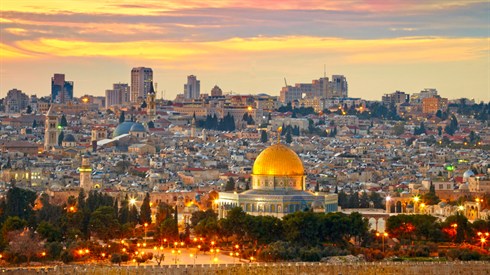- Shabbat and Holidays
- The Month of Elul
The Torah study is dedicatedin the memory of
Yaakov Ben Behora
9028
1. Days of Divine Favor
2. Selichot and Shofar
3. Charity
4. Tikkunim in Elul
5. Fasts
Days of Divine Favor
33. The forty days between Rosh Chodesh (New Month) Elul and Yom Kippur are more propitious for repentance than any other period of the year, for they are days of Divine mercy and favor. Though the Almighty accepts the repentance of his children all year, these days are most suited for repentance, for on Rosh Chodesh Elul Moses ascended Mount Sinai to receive the second tablets, and this was an indication and proof that God had accepted Israel's repentance and forgiven them for the sin of the Golden Calf and the breaking of the first tablets. Moses tarried on the mountain forty days during which he prayed to God to forgive Israel, and on Yom Kippur God said to him, "I have forgiven as you requested" and gave him the second set of tablets. Ever since that time, these days have been designated as days of Divine good-will, and the tenth of Tishrei has been observed as a day of forgiveness for the Jewish people.
34. Rabbi Yitzchak Luria (the Holy Ari) of blessed memory said: "It is written (Exodus 21:13), 'and if a man lie not in wait, but God cause it to come to hand, them I will appoint thee," etc. The Hebrew initials of the last four words of this verse (ina leyado vesamti lekha) spell out Elul, to signify that this is a propitious month to repent for the sins that one has committed the entire year. It further indicates that during this month one should also repent for sins committed unwittingly, for a person stumbles upon sins accidentally because of other sins he has committed intentionally (Kitzur Shulchan Arukh 128).
35. Those who interpret the law metaphorically say that the Hebrew initials of the four words "et levavkha ve-et levav" in the verse (Deuteronomy 30:6) "And the Lord will circumcise thy heart and the heart of thy seed" spell out Elul. Also, the initials of the verse (Song 6:3): "I am my beloved's and my beloved is mine" ("ani le-dodi ve-dodi li") spell out Elul. Likewise, the initials of the verse (Ester 9:22): "One to another and gifts to the poor" ("ish le-re'ehu u-matanot la-evyonim)" spell out Elul. These three verses refer to repentance, prayer, and charity, which should be assiduously practiced during this month.
36. "Know therefore this day, and return to your heart, that the Lord is God in heaven above, and upon the earth beneath; there is no other" (Deuteronomy 4:39). Rabbi Elazar, in the Zohar, explains that if you "know therefore this day," i.e., if you learn Torah and know God, then you will "return to your heart," i.e., you will be able to truly repent.
Selichot and Shofar
37. Sephardi Jews are accustomed to begin reciting Selichot (supplications for forgiveness) from the second day of Elul until Yom Kippur. Ashkenazi Jews start a few days before Rosh Hashanah (Rabbi Eliyahu discusses this matter in greater detail in his laws to Selichot).
38. Some Sephardi Jews have a custom to blow the shofar (Tekiyah, Shevarim, and Teruah) while pronouncing God's thirteen attributes of mercy during Selichot. And some have a custom to blow the shofar during the Kaddish before te'anuh ve-te'atruh. Some, however, do not blow the shofar at all.
39. Ashkenazi Jews are accustomed to blow the shofar from the first of Elul until Yom Kippur. The shofar is blown after the daily morning service. Some begin blowing the shofar from the first day of Rosh Chodesh, and some begin from the second day. If the shofar was not heard after the morning service it should be heard at the evening service (see Tur 581; Mishnah Berurah ad loc. 3). According to all opinions the shofar is not blown on the eve of Rosh Hashanah at all (Kaf HaChaim ad loc. 13).
40. We blow the shofar in this month in order to move the nation to repentance, for it is the nature of the shofar to stir the hearts and cause trepidation, as it is written, "Shall a shofar be blown in a city and the people not tremble?" (Amos 3:6). The shofar is also blown in order to "confuse the Accuser." Another reason for blowing the shofar is that Moses ascended Mount Sinai on Rosh Chodesh Elul to receive the second tablets, and the Israelites blew the shofar in the camp as a way of announcing that Moses had ascended the mountain. This was done so that the children of Israel would not err again regarding the number of days Moses spent on the mountain as they had the first time, when they made the Golden Calf. And the Almighty ascended with that shofar blast, as it is written (Psalms 47:6): "God has ascended with a blast" (Tur 581, and see Mishnah Berurah ad loc. 3).
41. Ashkenazi Jews have the custom to recite Psalm 27: "Of David, the Lord is my light and salvation" ("Ledavid, Adonai ori") from Rosh Chodesh Elul (See Midrash Rabba Vayikra 21, and see also Mishnah Berurah 581:2). Some recite this only at the morning prayer service, some also recite it at the afternoon service, and some recite it at the evening service as well. Those who follow the opinion of the Vilna Gaon (Maaseh Rav 53) do not recite this psalm. Those who do not recite Psalm 27 should recite other psalms. Sephardi Jews recite this psalm after prayer throughout the entire year (Moreh B'Etzbah 37).
Charity
42. "Charity saves a person from death" (Proverbs 10:2) and it certainly saves a person from numerous other calamities. Therefore, one should give charity constantly, especially during the month of Elul.
43. One who gives charity throughout the year should not give away more than twenty percent of his assets; however, if one gives charity in order to atone for his sins, he may give more than this amount.
Tikkunim in Elul
44. Some have the custom to recite psalms publicly or individually during these days, for psalms have the ability to instill the heart with love for God and fear of Heaven. The custom is to recite ten psalms each day in order to finish the entire book of Psalms twice by Rosh Hashanah, 300 psalms, which is equal to the numerical value of the Hebrew word "kaper," atone (Matteh Ephraim 581:8; Mishnah Berurah 3).
45. The wise men of Jerusalem have a custom to study Tikkunei Zohar each day during this period according to their ability. The most important thing is to begin on Rosh Chodesh Elul and to finish the seventy Tikkunim on Yom Kippur. Some make a practice of finishing Tikkunei Zohar according to the daily portions that appear in modern printed editions of this work, however, this division is not binding (Kaf HaChaim 581:7).
46. Some have a custom to send greeting cards in the month of Elul, and in them they wish others to be inscribed and sealed in the book of good life. Some add this blessing to any letter they write during this period of time. The purpose of this practice is to impress upon ourselves the importance of praying for others, not only ourselves, and to increase love, brotherhood, peace, and friendship (Matteh Ephraim 581:9; see Kaf HaChaim ad loc. 18; see also Be'er Heitev ad loc. 10).
47. Men of virtuous practice are accustomed to examine Tefillin and Mezuzot during this month and to fix whatever calls for correction (Matteh Ephraim 10).
48. Between Rosh Chodesh Elul and Yom Kippur it is good and proper for a person to examine his ways and deeds each night before going to bed. If one's actions are good, he should consider ways to improve them. If not, "A wicked person should change his ways" by reciting "vidui" (confession) and repenting. Though in truth a person ought to do this every night throughout the year, one should at least make an effort to do this during these forty days (Chidah in Moreh B'Etzba 243, brought in Kaf HaChaim 581:24).
49. On the twenty-fifth of Elul the creation of the universe began, and on Rosh Hashanah Adam was created. On the same day he was created he also sinned, was sentenced to punishment, and was pardoned. It is therefore good to read the Creation narrative from the twenty-fifth of Elul until Rosh Hashanah. On the twenty-fifth of Elul one reads from "In the beginning" until the end of the first day, and on each day that follows an additional day of creation is read, so that on Rosh Hashanah one reads the sixth day of creation (Kaf HaChaim 21; Birkei Yosef 581:19)
50. It is advisable for the shofar blower and his prompter to learn the laws relating to this task before Rosh Hashanah. They should know how to check the shofar to insure that it meets the requirements of Jewish law. This will insure that even if a mistake is made in blowing the shofar, they will know how to correct it, when to repeat and when not to, etc. (see Mishnah Berurah 581:11; Kaf HaChaim 39).
Fasts
51. Many have the custom to fast during the Ten Days of Repentance (Rema 70:2), and some are careful to fast for ten complete days. Because during the Ten Days of Repentance there are only six days on which it is permitted to fast (it is forbidden to fast on the two days of Rosh Hashanah, on Shabbat Shuva, and on Yom Kippur eve), those who wish to fast ten complete days fast on four days before Rosh Hashanah. In this case, preference should be given to Mondays and Thursdays, though it is permitted to fast on any weekday besides Friday (Shulchan Arukh 70:2; Kaf HaChaim ad loc. 55 and 562:14; Mishnah Berurah 581:6).
52. It is appropriate to fast on Rosh Hashanah eve itself.
53. On these fasts, when one must participate in a "seudat mitzvah" (a meal which accompanies a religious celebration), it is permitted to eat on that day and fast on another day instead. If a person knows in advance that he will be participating in a "seudat mitzvah," he should fast on some other day prior to the day of the "seudat mitzvah" (see Rema ad loc.).
54. These fasts are not obligatory, therefore, if fasting will cause a person to refrain from studying Torah, it is preferable that he learn Torah and not fast. Likewise, a frail person should refrain from observing these fasts in order to save his strength for the Fast of Gedaliah and Yom Kippur (Later Authorities).
55. One who wants to observe a private, non-communal fast must first accept upon himself to fast. This is done when one reaches the end of the Amida prayer (before the last "yihyu le-ratzon") of the Minchah afternoon service on the day before the fast. It is a good idea to recite the declaration that appears in the prayerbook (Shulchan Arukh 562:6). If one forgets to accept the fast upon himself at Minchah, he may do so even up until twilight, so long as he has not prayed the Maariv evening prayer.
56. Some authorities hold that a person who is accustomed to fasting during the Ten Days of Repentance need not accept the fast upon himself prior to fasting (see Shulchan Arukh 562:2).
Pre-Selichos 5779: The One Condition
Rav Judah Mischel | 14 Elul 5783

"Bring us back to You"
Rabbi Shaul Yisraeli zt"l | Shabat Shuva 5703

Repentance And Yom Hakipurim - A New Existence
Rabbi Chaim Katz | Elul 5754
We renew - in this year we will bring the Redemption!
Rabbi Shmuel Eliyahu | Elul 2 5781

Siyum for Taanit Bechorot Via Live Streaming
Rabbi Daniel Mann | Adar 29 5780
As Though You Yourself Came Out of Egypt
Rabbi Gideon Weitzman | 5765

Must I Toivel This?
Rabbi Yirmiyohu Kaganoff | Tamuz 25 5779





